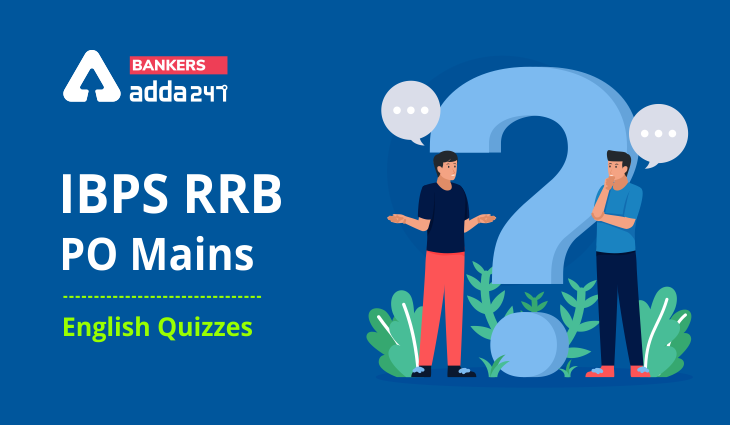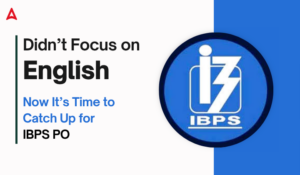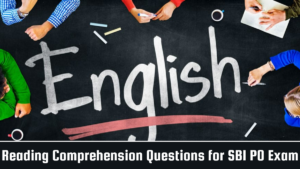Directions (1-5): In each of the questions given below a sentence is given which is then divided into five parts out of which first part is correct. There are no errors in three out of four remaining parts and therefore only one of the parts (other than the bold one) is incorrect. You must choose the grammatically incorrect part as your answer. If there is no error in any of the given parts, mark (e) .i.e. “No error” as your answer.
Q1. Mr. Shantivaram had on May 30 moved the court seeking(A)/ protection from arrest in the case, saying all evidence(B)/ in the matter appears to be documentary in nature(C)/ which is already of the possession of the incumbent government(D)/ and nothing was to be recovered from him(E).
(a) B
(b) C
(c) D
(d) E
(e) No error
Q2. The term of the existing panchayat raj bodies is(A)/ expiring on July 31 and the government’s efforts to(B)/ notify elections and complete(C)/ the process this month has(D)/ hit a legal hurdle(E).
(a) B
(b) C
(c) D
(d) E
(e) No error
QCreator Bank English
Q3. Indeed, the liver is a very important organ in(A)/ the body since it regulates(B)/ the metabolism of, between other(C)/ things, fat in the(D)/ form of lipid droplets(E).
(a) B
(b) C
(c) D
(d) E
(e) No error
Q4. Ninety years later, we still stay in the same(A)/ uncultured space. Superstars now nurture(B)/ criminal gangs who would hurled(C)/ racial abuses non-stop at(D)/ those who criticise them(E).
(a) B
(b) C
(c) D
(d) E
(e) No error
Q5. Recently, Indian cinnamon and food products containing(A)/ cinnamon were banned(B)/ in European countries(C)/ due to the high(D)/ content by coumarin(E).
(a) B
(b) C
(c) D
(d) E
(e) No error
Directions (6-10): Rearrange the following five sentences (A), (B), (C), (D) and (E) in the proper sequence to form a meaningful paragraph and then answer the questions given below.
(A) Time is not a continuous container of events. Rather it is like a train wreck on a child’s play table
(B) The nature of this synthesis, the breaking and the joining, as an affective state seems to determine his position with the past and the present
(C) Where the containers may be rejoined with little respect for chronology and set on their way again
(D) Not to know modern history is to enter the exhibition at your own peril
(E) What we see is episodes or fragments lifted out of their historic contexts and imbricated, embedded or rendered in another time
Q6. Which of the following will be the THIRD sentence after the rearrangement of the sentences?
(a) A
(b) C
(c) D
(d) B
(e) E
Q7. Which of the following will be the FOURTH sentence after the rearrangement of the sentences?
(a) B
(b) C
(c) D
(d) E
(e) A
Q8. Which of the following will be the FIRST sentence after the rearrangement of the sentences?
(a) E
(b) C
(c) A
(d) B
(e) D
Q9. Which of the following will be the LAST (FIFTH) sentence after the rearrangement of the sentences?
(a) D
(b) C
(c) A
(d) B
(e) E
Q10. Which of the following will be the SECOND sentence after the rearrangement of the sentences?
(a) C
(b) A
(c) B
(d) D
(e) E
Directions (11-15): The following statements have two blanks which are to be filled with the options given below. Choose the correct combination which can most suitably complete the sentence without altering the meaning of the statement.
Q11. The Athenians on the whole, were peaceful and prosperous; they had ____________ to sit at home and think about the universe and dispute with Socrates, or to travel abroad and ____________ the world.
(a) leisure, explore
(b) time, ignore
(c) ability, suffer
(d) temerity, understand
(e) courage, see
Q12. This simplified ____________ to the decision-making process is a must read for anyone ____________ important real estate, personal, or professional decisions.
(a) primer, maximizing
(b) tract, enacting
(c) introduction, under
(d) guide, facing
(e) way, struggling
Q13. Physicians may soon have ____________ to help paralysed people move their limbs by bypassing the ____________ nerves that once controlled their muscles.
(a) instruments, detrimental
(b) ways, damaged
(c) reason, involuntary
(d) impediments, complex
(e) preventions, static
Q14. Their achievement in the field of literature is described as ____________; sometimes it is even called ____________.
(a) magnificent, irresponsible
(b) insignificant, influential
(c) significant, paltry
(d) unimportant, trivial
(e) important, ineffective
QCreator Bank English
Q15. From the time she had put her hair up, every man she had met had groveled before her and she had acquired a mental attitude toward the other sex which was a blend of ____________ and ____________ .
(a) admiration, tolerance
(b) indifference, contempt
(c) impertinence, temperance
(d) arrogance, fidelity
(e) confused, chaos
Solutions
S1. Ans.(c)
Sol. Replace ‘of the possession’ with ‘in the possession’ as there should be correct use of the preposition.
S2. Ans.(e)
Sol. No error
S3. Ans.(b)
Sol. Replace ‘between’ with ‘among’ as when we talk about more than two objects, we use ‘among’ rather than using ‘between’.
S4. Ans.(b)
Sol. Replace ‘hurled’ with ‘hurl’ as modal auxiliaries will always be followed by the first form of the verb.
S5. Ans.(d)
Sol. Replace ‘by’ with ‘of’
S6. Ans.(a)
Sol. The correct sequence is DEACB; A
(Not to know modern history is to enter the exhibition at your own peril. What we see is episodes or fragments lifted out of their historic contexts and imbricated, embedded or rendered in another time. Time is not a continuous container of events. Rather it is like a train wreck on a child’s play table, where the containers may be rejoined with little respect for chronology and set on their way again. The nature of this synthesis, the breaking and the joining, as an affective state seems to determine his position with the past and the present.)
S7. Ans.(b)
Sol. C
S8. Ans.(e)
Sol. D
S9. Ans.(d)
Sol. B
S10. Ans.(e)
Sol. E
S11. Ans.(a)
Sol. leisure, explore
S12. Ans.(d)
Sol. guide, facing
S13. Ans.(b)
Sol. ways, damaged
S14. Ans.(d)
Sol. unimportant, trivial
S15. Ans.(b)
Sol. indifference, contempt
Click Here to Register for Bank Exams 2021 Preparation Material





 Didn’t Focus on English? Now It’s Time t...
Didn’t Focus on English? Now It’s Time t...
 Reading Comprehension Questions for SBI ...
Reading Comprehension Questions for SBI ...
 Fillers Questions for SBI PO Mains Exam ...
Fillers Questions for SBI PO Mains Exam ...


